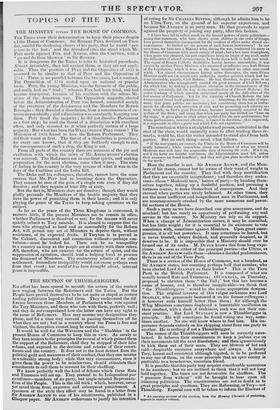TOPICS OF THE DAY.
THE MINISTRY versus THE HOUSE OF COMMONS.
THE Tories avow their determination to keep their places despite of the House of Commons. Sir ROBERT PEEL declared on Tues- day, amidst the deafening cheers of his party, that lie would "per- severe to the last ;" and the Standard cites the stand which Mr. PITT made against Fox and NORTH, after the Coalition, with a " go and do thou likewise" to Sir ROBERT.
It is dangerous for the Tories to refer to historical precedents. almost invariably, they tell against them, or they are not appli- cable. Thus the position of PEEL and the Oppositiou of 1835 is assumed to be similar to that of PITT and the Opposition of 1784. There is no parallel between the two cases, but a contrast.
The Opposition of 1784 rested upon no national or popular basis. Pirr, the young Minister, was the favourite of the public, and really had no " trial ; " whereas Fox bad been tried, and had become unpopular, because of his coalition with the odious Mi- nister of the American war. The Opposition majority, elected before the Administration of PITT was formed, consisted mainly of the creatures of the Aristocracy and the Members for Rotten Boroughs : they dreaded a dissolution, from a consciousness of ex- treme unpopularity ; and a dissolution was constantly hanging over them. PITT faced the majority ; lie did not dissolve Parliament as a first step ; he used the threat of a dissolution with excellent effect, and only resorted to it when perfectly certain of a large majority. But what has been the WELLINGTON-PEEL course ? The Ministers of 1835 feared to face the Reform Parliament. They did their worst at first. The threat of a dissolution is powerless ; for every one knows, that if they are foolhardy enough to risk the consequences of such a step, the King is not.
From all parts of the country there are accounts of the joy and exultation with which the news of Mr. ABERCROSIRY'S election was received. The Reformers are in excellent spirits, and making preparation for the next election, come when it may. The state of feeling in the country is the very reverse of what it was in the days of the Coalition and the India Bill.
The Duke and his colleagues, therefore, cannot have the same success that Mr. Pi rr had in breaking down the Opposition. They cannot be sure of the gain of a single vote even if they did dissolve; and they require at least fifty or sixty.
But the fact is, Ministers dare not dissolve; though they would gladly persuade the Members of the hostile majority that they have the power of punishing them in their hands; and it is only playing the game of the Tories to keep asking questions on the subject.
As far as the peace of the Three Kingdoms is concerned, it matters little, if the present Ministers are to remain in office, whether Parliament is dissolved or not; for the masses will never quietly submit to Tory misrule. It is absurd to suppose that the men who struggled so hard and so successfully for the Reform Act, will permit any set of Ministers to deprive them, without resistance, of its expected fruits. If Toryism is to prevail in the Cabinet, discontent and commotion without—perhaps con- vulsion—must be looked for. There can be no tranquillity in a country as long as the people are at enmity with their rulers. All, therefore, who are anxious for the return of quiet, and the suppression of agitation, should lend a helping hand to procure the dismissal of Ministers. The controversy admits of no other settlement. Immediate tranquillity would not ensue perhaps even from that event ; but until it has been brought about, internal peace is impossible.



























 Previous page
Previous page